Poco X2 Will Be a Rebranded Redmi K30 4G; But Is That a Bad Thing?
[the_ad id='1307']
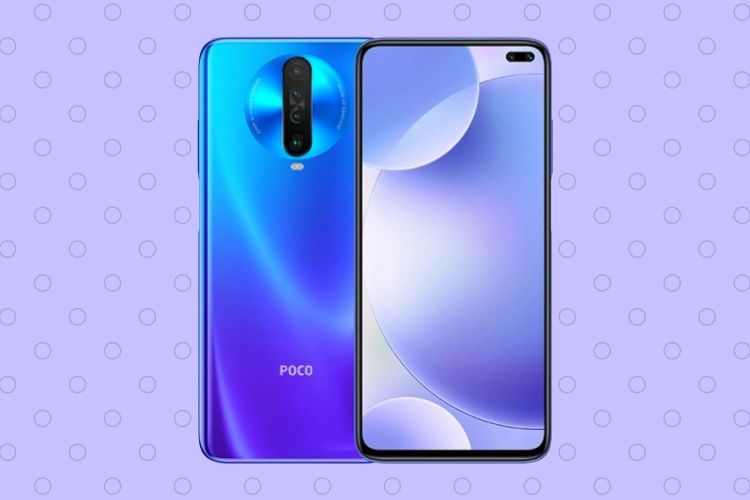
Just when we were ready to write off Poco as a one-off hard hitter, it’s back from the dead. About one and a half year after the Poco F1 launch, we recently learned Poco is going independent from Xiaomi and will be launching more than just a flagship. The company isn’t wasting any time and has proven that right by teasing the Poco X2, which arrives in India on 4th February next week.
I know, most of us spent the last year waiting for the answer to one question – when is the Poco F2 launching? Well, it’s coming sometime in 2020 but Poco is kicking-off its comeback with a mid-range offering and that’s quite exciting. Not for a lot of Poco fans though. Some users are ready to write off the Poco X2 before launch because of the one simple fact – it’s going to be a Redmi K30 4G rebrand.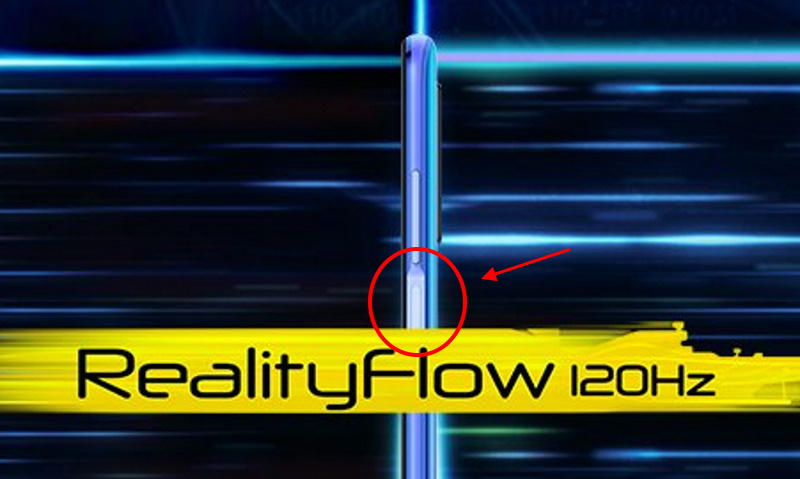
Yeah, if you take a close look at the teasers, Poco X2 will be a rebranded Redmi K30 4G that was launched in China back in December 2019. It’s confirmed and Poco fans are already revolting on social media about it not packing an upgrade over their beloved Poco F1, blinding an eye to a host of other features including and especially the higher refresh rate. Something I find hard to digest.
So, here are the reasons why I think that Poco X2 being a Redmi K30 4G rebrand isn’t a bad thing. Hear me out –
120Hz LCD > 60Hz AMOLED
Even before I get into the debate about the Poco X2’s display, I want to mention that the device will boast a premium glass build – something that was lacking on the Poco F1. It’s one of the major upgrades over the Poco F1’s bland plastic build.
Coming to the display, the Poco India team today confirmed that the Poco X2 will land in India with a 120Hz LCD display. The device will be a rebranded Redmi K30 4G, so this means you will get a tall 6.67-inch Full-HD+ IPS LCD display instead of a crisp AMOLED panel — that too with a modern dual-camera punch-hole. It’s a 20:9 panel with HDR 10 support.
You wanted to hear this. It's time to Xperience the Xtreme with a display that is #SmoothAF. Introducing the awesome 120Hz display on the #POCOX2. pic.twitter.com/sl8y1p01kA
— POCO India (@IndiaPOCO) January 28, 2020
Now, since the company revealed the presence of the higher refresh rate display, along with a look at the silhouette of the Poco X2, fans have been calling out the company for sticking to an LCD panel. Everyone expected Poco to take the complaints and issues the users faced with the F1’s display to see the company bake an AMOLED display into their next phone. But, that’s not happening with this mid-ranger and don’t users want a high refresh rate display – which is preferable for gaming?
We decided to conduct a poll over on Twitter to find out what Beebom fans would pick – a 120Hz LCD display or a 60Hz AMOLED display? Well, the result (after around 4500 votes) was surprising to me as around 74% of users gravitated towards a low refresh rate AMOLED panel as compared to a higher refresh rate LCD panel.
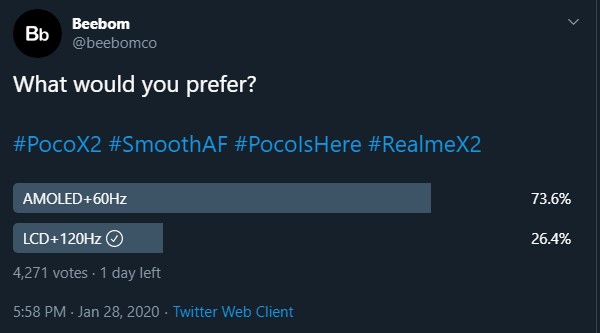
This is shocking to me because LCD display used by Xiaomi are known to be quite color accurate and when you couple it with a higher refresh rate, it’s going to make for a fluid experience in the sub-Rs. 20,000 price segment. You do get more punchy colors, deeper blacks, and an in-display fingerprint scanner with an AMOLED panel, but a higher refresh rate (that makes for a fluid experience) has more weight in my books.
You have to try out a 120Hz panel first to be able to compare it against a standard 60Hz panel. The 60Hz display will feel lackluster. I can vouch for it. Also, Redmi K30 4G (it will launch as Poco X2 in India) is the first Redmi phone with a higher 120Hz refresh rate and you won’t find any competitors to it in the mid-range segment. But, I would like to hear your take on it as well. Do share with me your point of view in the comments below.
64MP Sony IMX686 Sensor
Pulling myself out of the display debate, Poco X2 will also feature a vertical quad-camera setup backed by the 64MP (f/1.89) Sony IMX686 sensor (as teased via the Flipkart listing) at the helm. It will be coupled with an 8MP (f/2.2) ultra-wide-angle lens with 120-degree FOV, a 2MP (f/2.4) macro lens, and a 2MP depth sensor. Now, I know it skips the telephoto lens, which we find on the Redmi K20, but it is a likable upgrade over the Poco F1’s dual cameras.
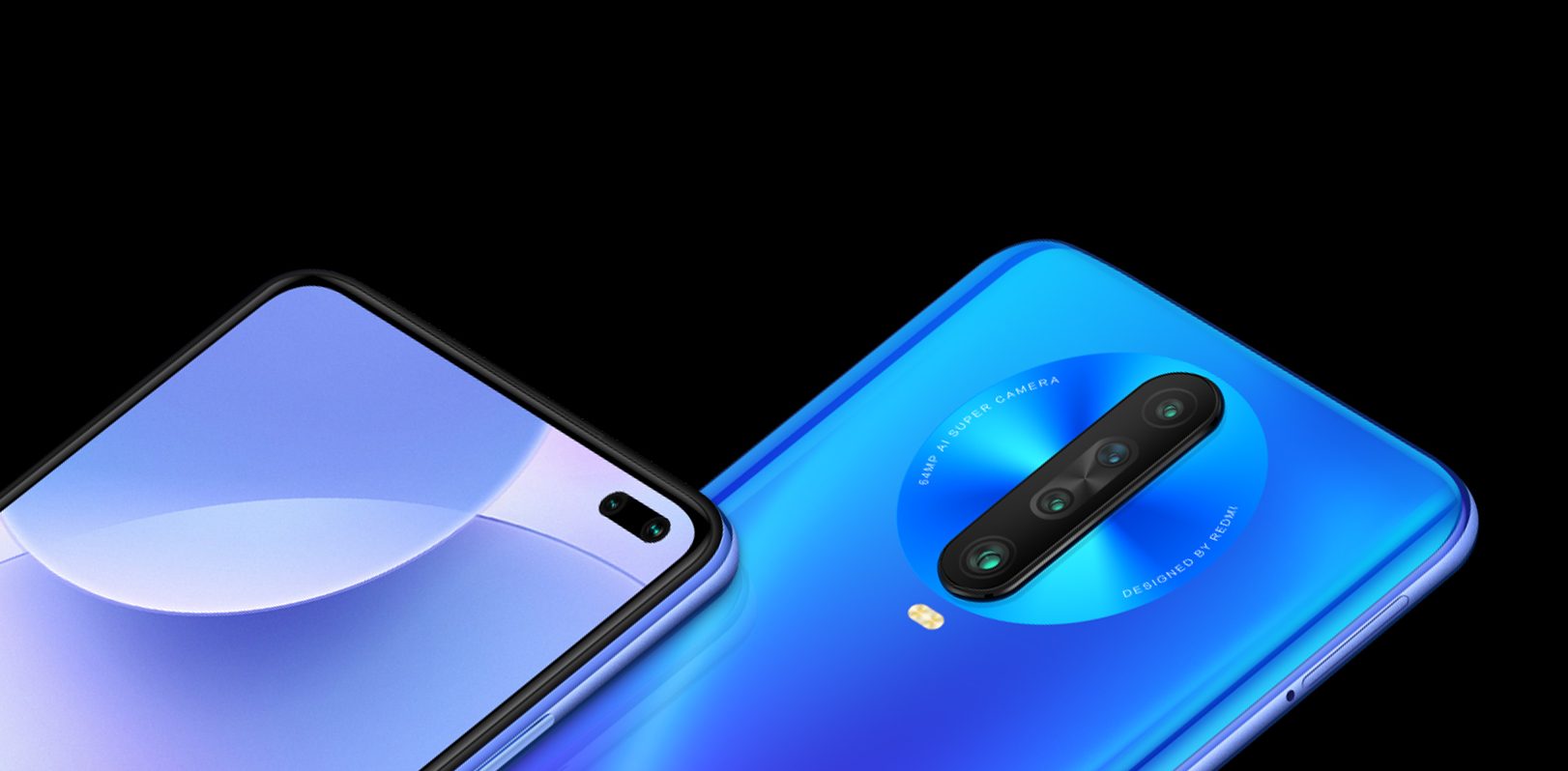
Also, on the front, you now have a dual-camera punch-hole setup on the right. It comes backed by a 20MP primary camera and a 2MP depth sensor with a wider 83-degree FOV. This means the Poco X2 could turn out to be a great gaming-cum-streaming companion, thanks to the selfie cameras and the processor onboard. We are going to talk about the latter next.
All the Gaming Power You Need
Poco X2 being a rebadged Redmi K30 4G means it will come baked with the Snapdragon 730G chipset, which is a gaming-centric chipset that can be found in the Realme X2 and Redmi K20. This means you are getting a powerful chipset with an overclocked GPU and performance comparable to the Snapdragon 845 chipset, which runs the show under the hood on the Poco F1.
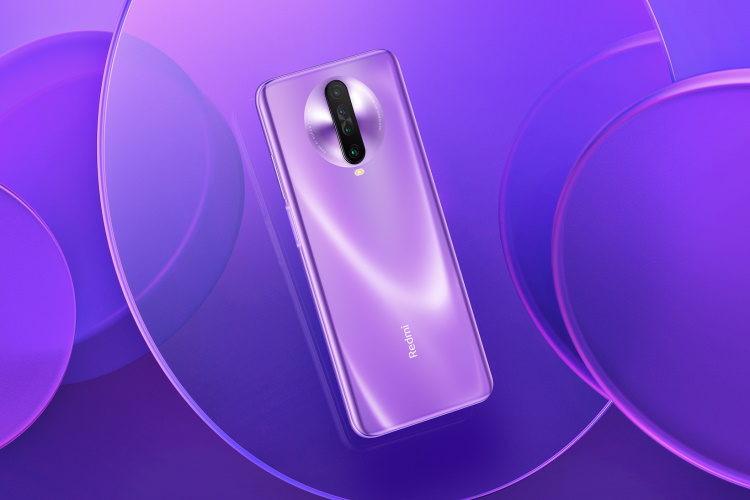
We did a benchmark comparison test between the Snapdragon 730G and 845 chipsets not long ago, so do check it out. Also, PUBG is expected to enable 90FPS support soon, so the chipset onboard paired with the 120Hz display will make a killer gaming combo. Don’t you think so too?
Let’s not forget the software while we are at it. Poco X2 will not bring a stock Android UI, as many might expect. It will continue to be backed by MIUI for POCO, which we know is not drastically different from the standard MIUI custom skin we find on all Xiaomi phones, but the cleaner look and feel of the Poco launcher adds up to a smooth user experience. I would like to see more progress being made in the software department over the coming months.
27W Fast Charging, What??
Finally, if the Poco X2 will arrive as a rebranded Redmi K30 4G then it will house a huge 4,500mAh battery pack to back the 120Hz IPS LCD display. One of the shortcomings of the LCD display is that individual pixels don’t turn off, so a greater amount of battery will most likely be consumed by this device. Redmi made amends for this by offering a 27W charger in the box and so will the Poco X2, which is great! This will be another highlight for the mid-range Poco X2 and an upgrade over the Poco F1.
Endgame: Pricing Is What Matters Most for Poco X2!
As it currently stands, the Poco brand is synonymous with feature-rich flagship offering at an unbeatable price. But the thing that we all need to remember is that the company has only launched one smartphone to date. It raised the bar for its competitors while lowering the entry point for users. That’s what defined the Poco F1. You got a flagship package for the fraction of the price.
Now, Poco is venturing into uncharted territory – launching a smartphone with decidedly mid-range specs in a market that’s already saturated and highly competitive. You will be seeing another Snapdragon 730G-powered device with a 64MP camera and fast-charging support but it’s the 120Hz display that will set it apart. We need to take a back seat with the LCD vs AMOLED debate because it’s the specs-to-price ratio that’s going to matter at the end of the day. And we all know that it’s a doozy.
Poco will now need to remember what made it a force to reckon with in the Indian market. And most importantly, I think Poco should focus on its brand perception and that means it should price the Poco X2 aggressively to take on the likes of Realme and Redmi in the mid-range segment. The Redmi K30 4G was priced starting at 1599 yuan (around Rs. 16,400) in China last year and if Poco manages to match the same in India, undercutting both the Realme X2 and Redmi K20, then we possibly have a winner in our hands. Don’t you think so too? Share your opinions with us in the comments section below.
[the_ad id='1307']
Source link
[the_ad id='1307']